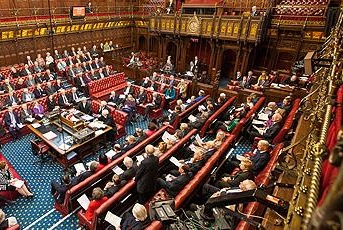Lords vote to add new clause to restrict age assessments of asylum seekers
On the third day of its report stage in the House of Lords, the Government's Nationality and Borders Bill continued to suffer a number of defeats. It adds to the 13 earlier defeats inflicted on Bill on the first two days of report stage last week.
 Image credit: UK GovernmentThe Lords voted yesterday evening by 232 votes to 167 to amend the Bill so that it includes a new clause 64A with safeguards and restrictions on the Government's power to carry out age assessments of age-disputed asylum seekers.
Image credit: UK GovernmentThe Lords voted yesterday evening by 232 votes to 167 to amend the Bill so that it includes a new clause 64A with safeguards and restrictions on the Government's power to carry out age assessments of age-disputed asylum seekers.
The Refugee Council said the result of the Lords' vote was an important victory for many children's campaigners.
The amendment was supported by the Refugee and Migrant Children's Consortium. In a briefing to the Lords, the Consortium said the new clause 64A is based on principles from international and domestic law and guidance, and it sets out what an expert and fair age assessment process should look like.
By 213 votes to 142, the Lords voted to remove clause 58 from the Bill.
Clause 58 sets a deadline for potential victims of trafficking or modern slavery to disclose the full details of their exploitation to the Home Office, as otherwise their credibility would be damaged.
The Lords voted by 210 to 128 to amend the Bill's clause 62.
Clause 62 would disqualify potential victims of trafficking or modern slavery with criminal records from receiving protection through the National Referral Mechanism (NRM). The Lords' amendment limits powers to remove protection from victims so that it only applies to those who pose an immediate, genuine and serious threat to public order.
The Lords also voted yesterday night to make two other amendments to Part 5 of the Bill concerning modern slavery, including replacing clause 64 with a new clause that would provide support and leave to remain for recognised victims of slavery or human trafficking.
By 141 votes to 107, the Lords voted to remove the Bill's requirement for Electronic Travel Authorisation for people travelling from the Republic of Ireland to Northern Ireland who are not British or Irish.
Report stage continued into the early hours of the morning. It was finally adjourned at 2am.
The Lords failed to vote for an amendment adding a new clause to the Bill on citizenship fees, which included specifying that fees should not be set at a level beyond their administrative cost. Baroness Bennett said it was a farce that the Government had won the vote at 1am in the morning by 69 votes to 25.
With report stage concluded, the Bill will be reprinted to include all the agreed amendments and it then moves to its third and final reading in the House of Lords on Monday, 14 March.
As explained by the Institute for Government, if the House of Lords and the House of Commons do not agree on the wording of a bill, it is sent back and forth between the two Houses and they respond to each other's proposed amendments in a process known as 'ping-pong'.